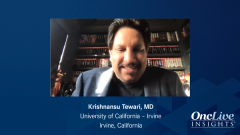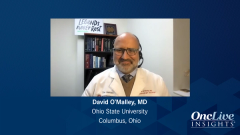
Biomarker Testing in Endometrial Carcinoma
An overview of biomarker testing in endometrial carcinoma.
Episodes in this series

Krishnansu Tewari, MD: What biomarkers do you test at diagnosis? What are you asking your pathologist to do? Is TP53 among them?
David O’Malley, MD: I’ve been fairly frustrated. I love my pathology colleagues. The group in molecular pathology is wonderful, but we haven’t adapted in being able to practically check POLE, and we’re not routinely getting TP53. For which patients are you going say, “I want that.” Is that going to change what we do on most of these patients? With some of the evolving data, it could change.
Krishnansu Tewari, MD: Tell me about some of the evolving data. Brad, do you want to take this, with respect to TP53?
Bradley Monk, MD, FACOG, FACS: Let’s tell our audience the right way to work up a newly diagnosed endometrial cancer for biomarkers. It’s pretty simple. You do the IHC [immunohistochemistry] for the 4 MMR [mismatch repair] genes. TP53 is easy; it’s an IHC as well. There are 2 scenarios where TP53 is mutated. It’s overexpressed because the gene is mutated and the protein accumulates, or it’s TP53 nodal, where it’s negative. Both are TP53 mutated. The dark is overexpressed, or the light is nodal. The model in between is TP53 wild type, so that’s routine. If you’re a believer that estrogen and progesterone receptor are important, you should do that. Finally, if it’s a uterine serous cancer, you should do HER2/neu [human epidermal growth factor receptor 2]. It’s mismatch repair deficiency, TP53, hormone receptor, and HER2. That’s the way you do it. Let’s talk about TP53 as a target when we get into the recurrent setting, in which case mutation still is the adjuvant.
Krishnansu Tewari, MD: It will be exciting to share some of the news then. Any other biomarkers you’re interested in, Dave?
David O’Malley, MD: I’m interested in seeing what the PORTEC-4a trial turns out. Outside clinical trial we’re not quite ready for those. As we evaluate this, Brad, you brought up a good point: what are the things we should absolutely check?
Krishnansu Tewari, MD: What if they’re MSI [microsatellite] stable? Do you go further and order a tumor mutational burden on these patients?
David O’Malley, MD: I don’t in the early-stage disease. Should we begin next-generation sequencing looking for POLE, knowing that that’s an important risk factor? Should we go to the PORTEC-4a trial, which looks at CTNNB1 as well as L1CAM? We’re not doing that. Outside a clinical trial, I’m not ready to do that. But that’s something we need to consider in the future.
Bradley Monk, MD, FACOG, FACS: That’s in the adjuvant setting, but I’ll bet that when you get stage IV recurrent, that’s when you’re doing the POLE. That’s when you’re doing the tumor mutational burden and some of these other targeted opportunities. It’s important to separate the 2 buckets where chemotherapy is used: adjuvant and stage IV recurrent. All the studies we’re doing except for the KEYNOTE-B21 trial adjuvant are in stage IV recurrent disease.
David O’Malley, MD: That’s a really important point. We’re not there with regard to significantly changing our adjuvant setting based on the molecular markers. That may be TP53. You’ve got a grade 3 endometrioid deep invasion. Are you going to give chemotherapy to that patient vs other observation vs vaginal cuff brachytherapy? That’s the biggest question mark.
Transcript edited for clarity.







































